When preparing a resume, your aim should be to prepare one that represents you well and increases your chances of getting the job. For example, a standard format that focuses on professional experience or work history might not be suitable for a job candidate with little to no experience. For such a case, you will need to use the functional resume, which allows you to display your skill set and present you as a qualified candidate for the hiring manager.
With this article, you will learn more about the functional resume, its structure, and how it works for job applicants who wish to stand out among other candidates in the job hiring process.
A functional resume is a format that allows you to focus more on the skill set you have rather than on your work history or career progression.
Instead of focusing on the professional experience, it focuses on your professional skills. If you want to change your career, have employment gaps, or have a highly developed group of skills, a functional resume is the best option if you wish to impress the job recruiter.
It is different from a standard chronological resume that is used by most job applicants. With a functional format, candidates group their experience under skill categories which is different from the chronological resume format where their experience is categorized under job titles. This is because it focuses on your skills by allowing you to include examples of those skills and highlight how you applied those skills in your work and life experiences.
When and Who Can Use?
The situations when and the people who can use this format are as shown below:
When
There are instances when you will need to use a functional format to stand out among other job candidates. Use it if you are a first-time job applicant who lacks work experience. You will be able to emphasize the skills, traits, and attributes you possess rather than focusing on career accomplishments that you do not have. Instead, categorize your skills and mention five examples of your best achievements in each category.
- The job you want requires details about your skills and expertise rather than experience. Some jobs require people who have certain specific skills. With a functional resume, you can put yourself in the spotlight by highlighting and focusing on all the hard, soft, and technical skills you possess.
- If you want to change careers by moving from one industry to another, you might lack the required work experience. It will help you focus on your transferable skills, qualifications, and achievements, allowing you to stand out among other job candidates.
- Finally, use this resume when you have employment gaps in your career. Instead of focusing on your work experience, where your prospective employer will spot the gaps in your career, use it to focus on your skills, accomplishments, and achievements in relation to the job position you are applying for. Even so, ensure that you can explain the gaps in your employment history.
Who
The most common candidates that should use this format are shown below. These job candidates must focus more on their skills to capture their prospective employers’ attention.
- Creative types: You can build a skill-based portfolio that will allow you to express your creative skills and talent.
- Overqualified job candidates: With a functional resume, you can display all the skills you have as an overqualified candidate.
- Military transitioner: If you are moving from the military and looking for a job, your military work experience may be hard to showcase. That is why describing your skills and qualifications, is better.
Functional Vs. Chronological Vs. Combination Resume
Significant differences exist among the three resume formats: functional, chronological, and combination. The type you choose to use will depend on your education level, professional background, and the job position you are applying for.
Remember that it is best to use the functional resume if you are changing careers or industries, have employment gaps, or lack the required work experience. With this resume format, you will focus on your skills and qualifications rather than on the work history that you do not have. Also, this resume structure will enable your prospective employer to quickly identify your strengths in relation to the job position you want.
The reverse-chronological resume format, allows you to focus on your work experience by detailing it from your newest to oldest. This way, your prospective employer can clearly understand your career progression. Also, it is advisable to use this format if you have few employment gaps or are a professional with excellent work history and experience.
The combination format is a mix of both chronological and functional resumes. With this format, you can highlight your skills, abilities, and your work experience. This format requires you first to list your skills and strengths and then follow your work history chronologically. If you are a professional with a diverse background or a creative like a designer or artist, this must be your preferred format.
Functional Resume Format
A functional resume format involves arranging your resume’s content in the following ways:
- Summary details
- Relevant skills
- Work experience
- Education details
Ensure you type all the information using a professional font and use the resume keywords provided in the job description when describing your skills. Since this is an official document, you need to focus on the font style, font size, margins, and spacing so as to achieve cleanliness and readability.
Your font size should be between 10 and 12 points. Ensure you use readable fonts like Times New Roman, Arial, or Helvetica with margins of 1 to 1.5 inches. It is also important to make your name and section headers bold and of bigger font size. Ensure you maintain a font size of 14 points. Finally, use bullet points when listing information for your different sections.
How to Write a Career Change Functional Resume
To properly create a functional career change resume, you must include the following information in your document:
Indicate your contact information
Start by first including your contact details in the resume. This will include your official name, email, phone number, and address (city and state of residence). You do not have to include private information such as your street address.
EXAMPLE
Ben White
Peach Avenue, AL 30192
234 222 3333
whiteben@gmail.com
Summary
After including your contact information, proceed to write your summary. Although this section is optional, it is essential to include it as it provides the hiring manager with context about you. Other than your professional background, a summary gives details of your personality. This section should include your essential experience, relevant skills, and career goals.
EXAMPLE
Hotel manager with two years of experience, overseeing employees and administering required hotel services such as accommodation and catering. As a hotel manager, skilled in managing hotel budgets, customer service skills, resilience, and management tasks. Passionate about reducing customers’ and guests’ complaints by 50% by ensuring the staff observes all the guidelines and rules.
Specify your skills
Proceed to list your specific skills and abilities. It is best to list this section by considering the keywords provided in the job description. Next, you can group your skills according to the required skill categories. Under each category, you need to include 4 to 5 bullet points describing your most relevant achievements regarding the skills you possess.
Since a functional format is all about skills, this section should not just include a list of skills you have. It should also focus on how you applied your skills to complete your responsibilities and the kind of achievements you achieved based on that. You can include numbers to present yourself as a result-driven individual.
EXAMPLE
Excellent communication skills
- Interviewed, coached, and trained new staff at the hotel to ensure they adapted to the hotel rules and standards.
- Held meetings with the catering and accommodation staff to discuss and tackle any issues they had in their respective departments.
- Welcomed guests to the hotel, resolved complaints, and listened to their feedback, improving their experience.
- Communicated with the staff during team building, which led to a 30% improvement in the quality of work since they were all complacent with their responsibilities.
Professional experience
Although you may not have much to share concerning professional experience, you will need to include some details of the work you have done in your previous place of work. Ensure the information you include in this section is relevant to your job. Write this section by listing the workplace, your main contributions, and the year you worked there.
EXAMPLE
Hotel Coming Soon, 20XX
Improved the hotel services and facilities to maximize the occupancy for guests, clients, and customers
Education
The final section is the education part. You will need to include the name of your educational institution, the area of study, and the achievement you received. You can leave this section if the education information is irrelevant to your job position.
EXAMPLE
Spring Space University, 2013-2017
Bachelor of Science in Hotel Management
Ensure that you proofread and edit your resume before sending it. Including a cover letter when sending your job application documents is also essential as it will help complement your resume.
Resume Examples and Templates
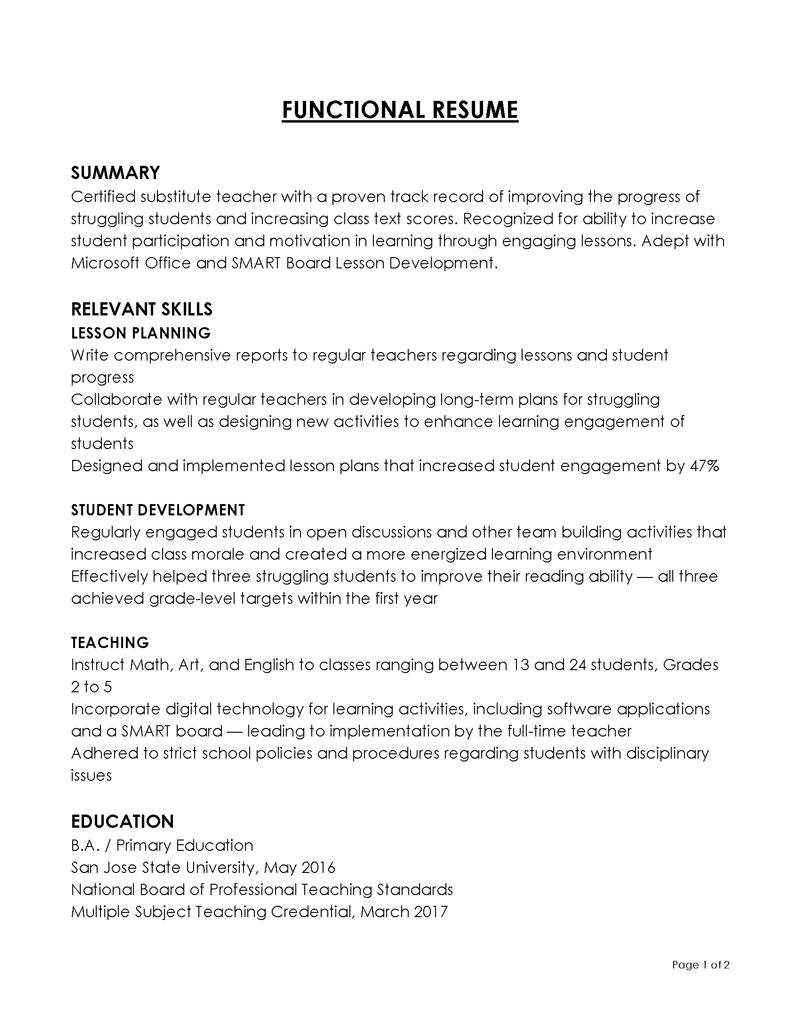
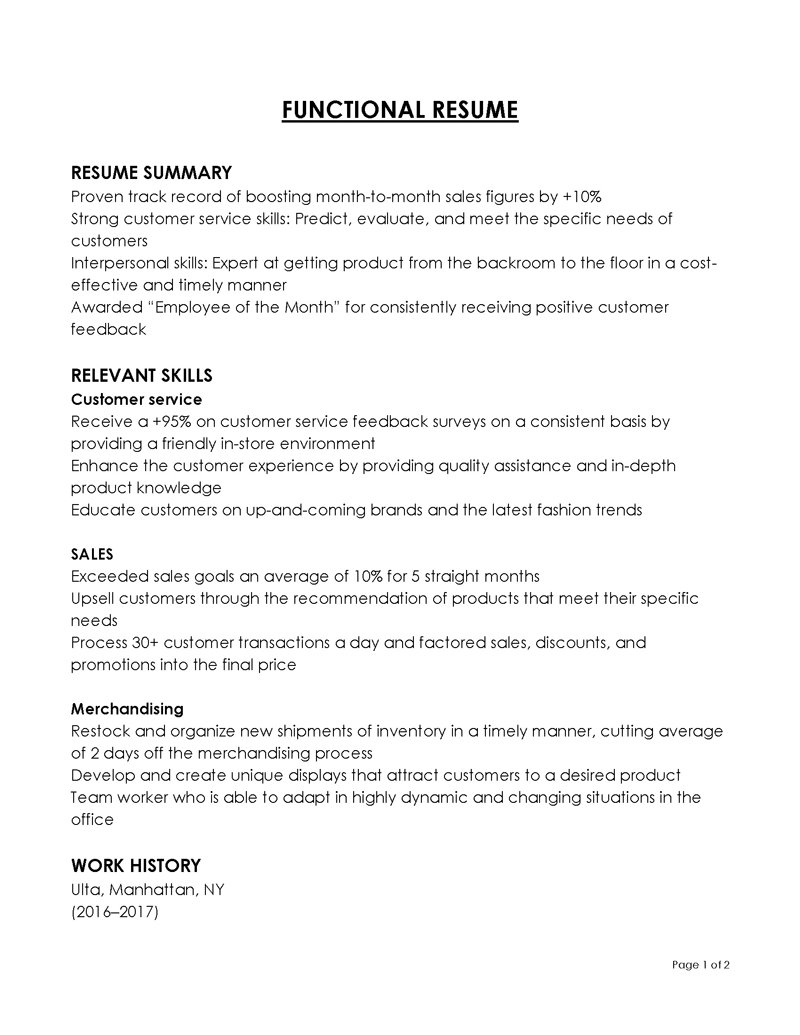
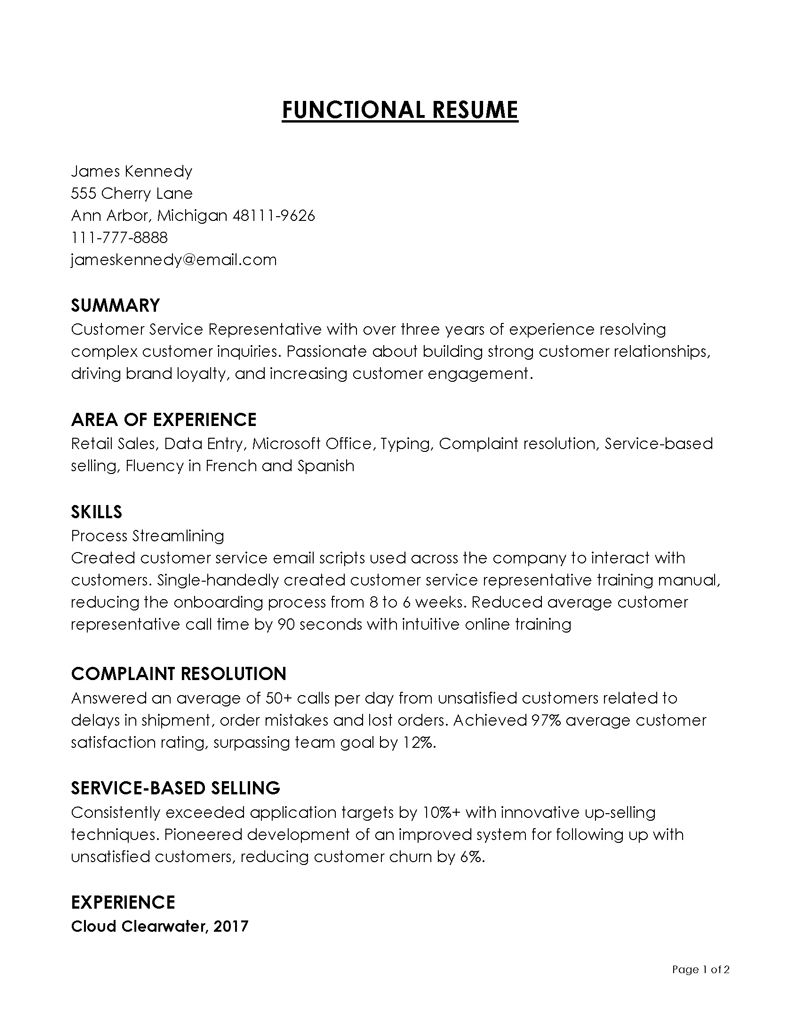
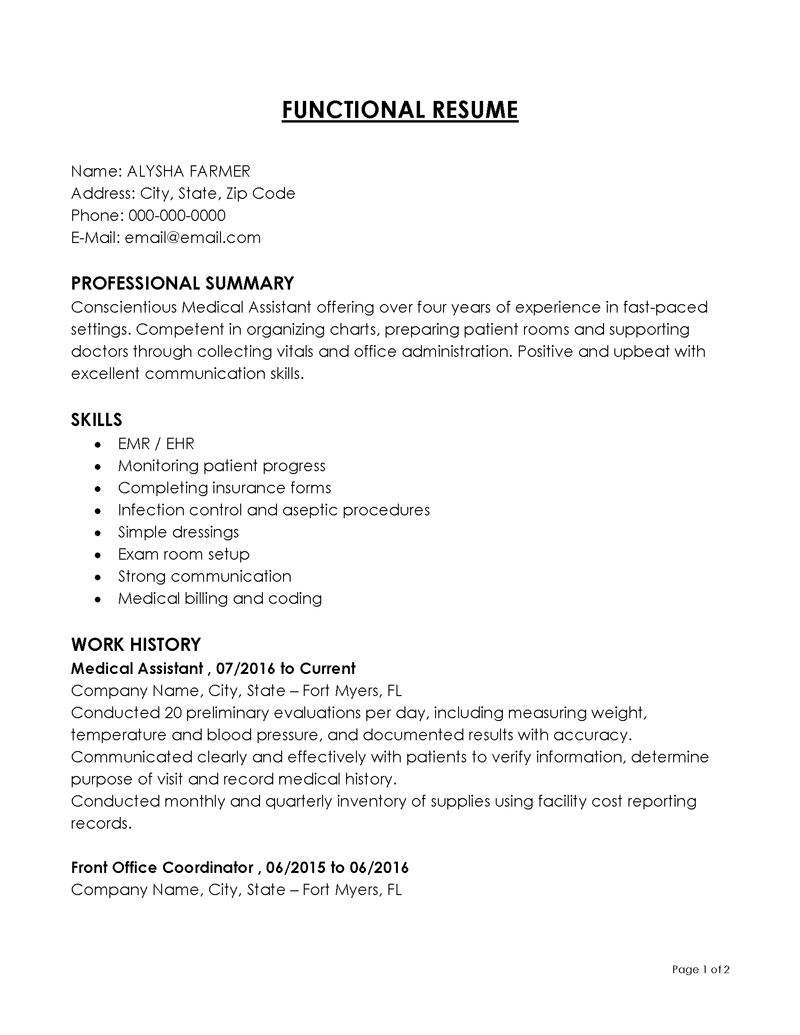
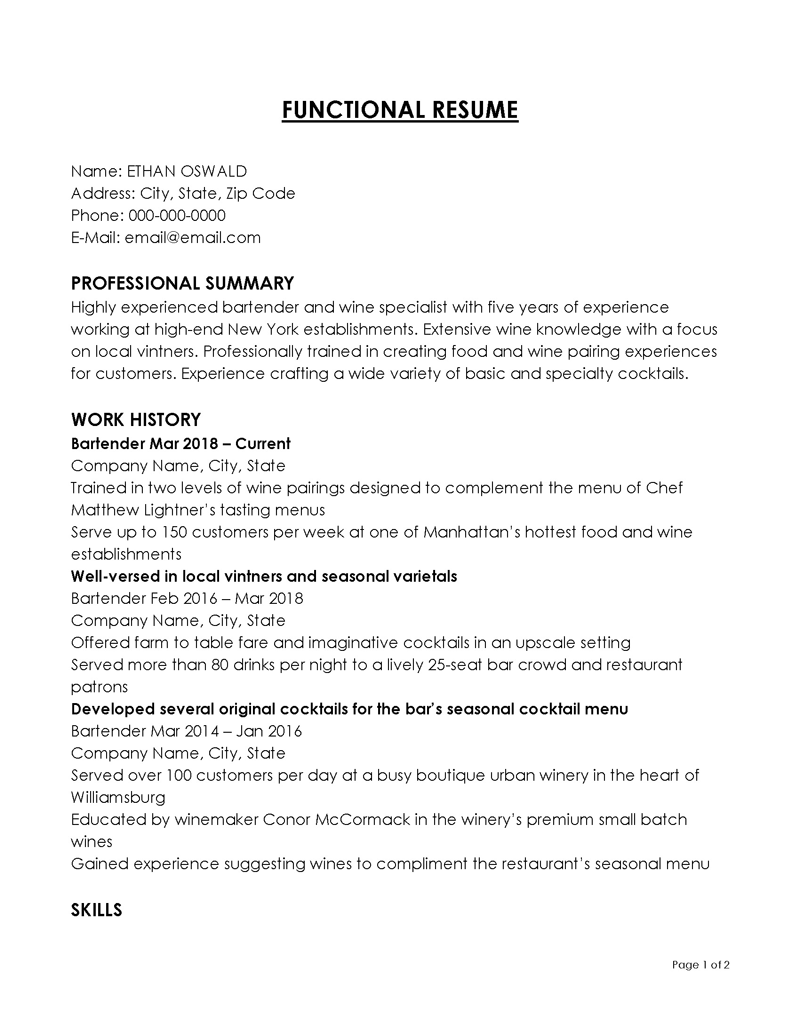
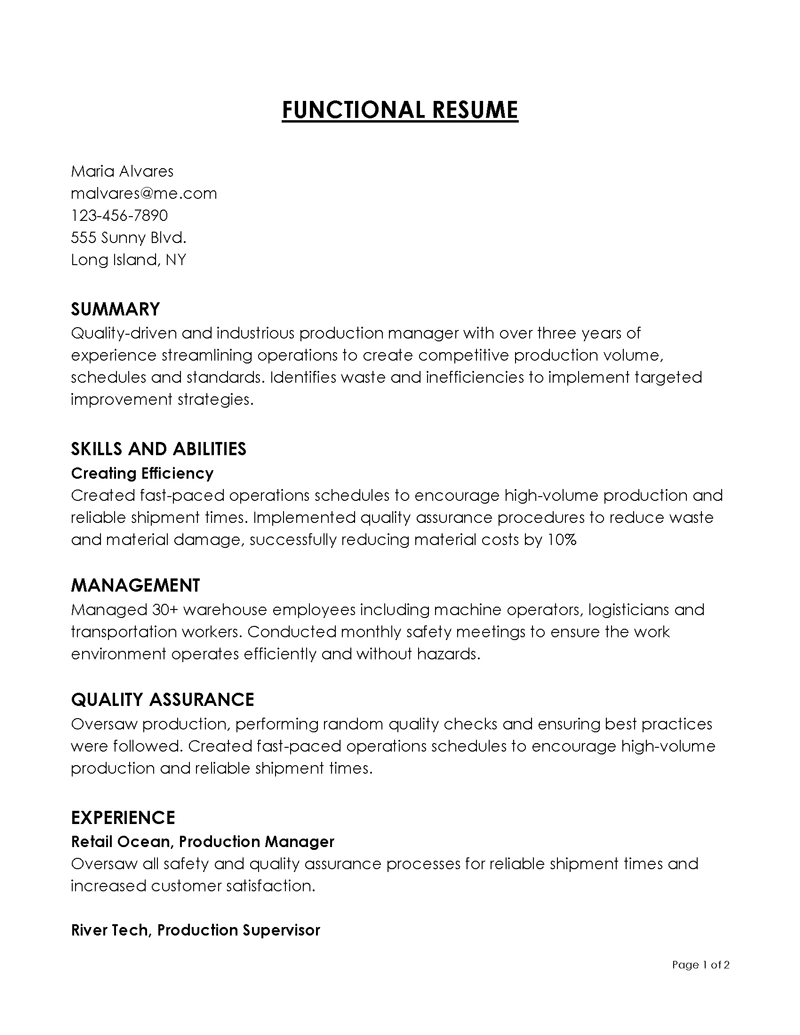
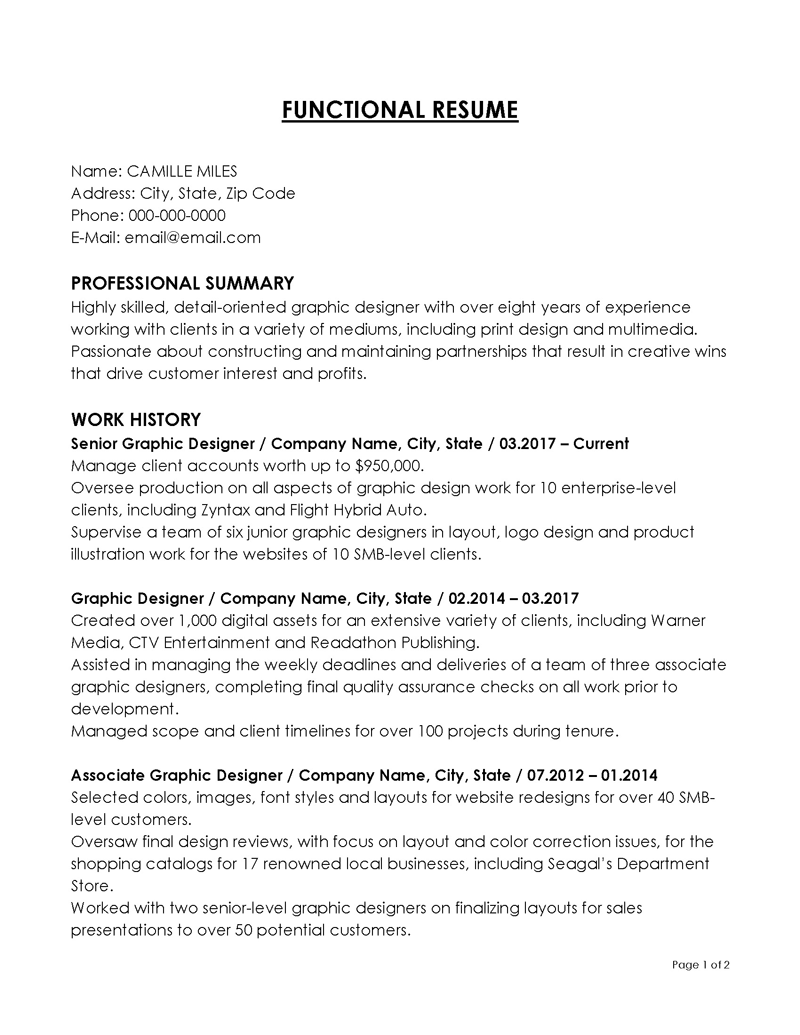
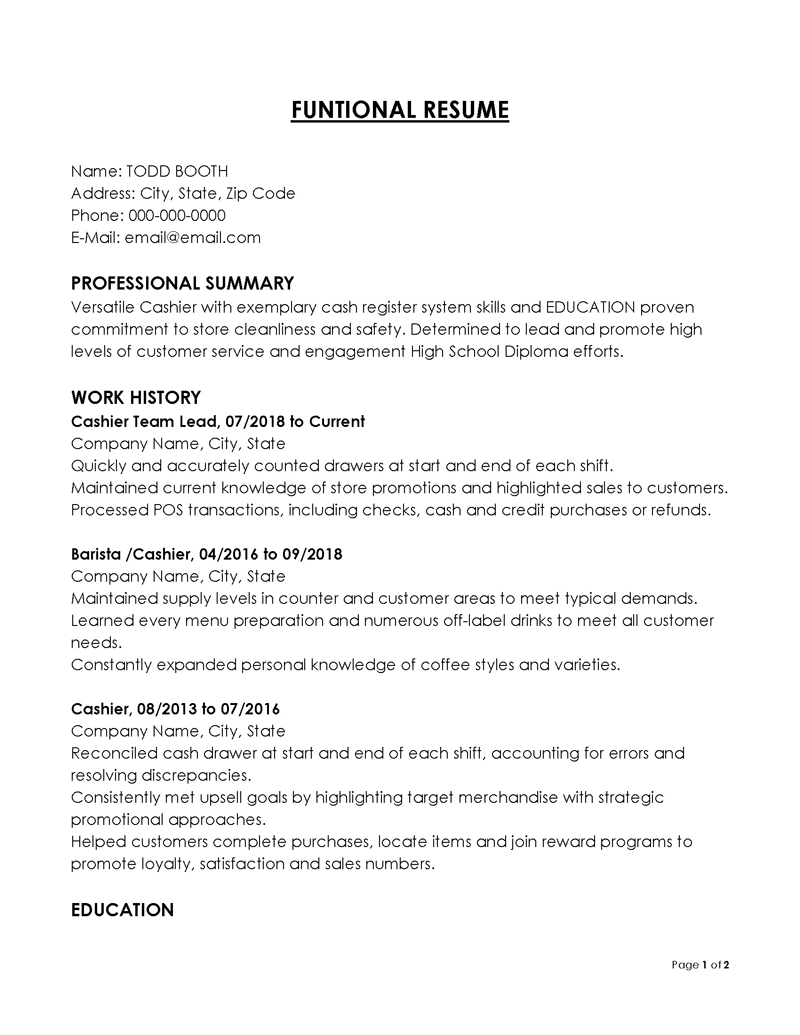
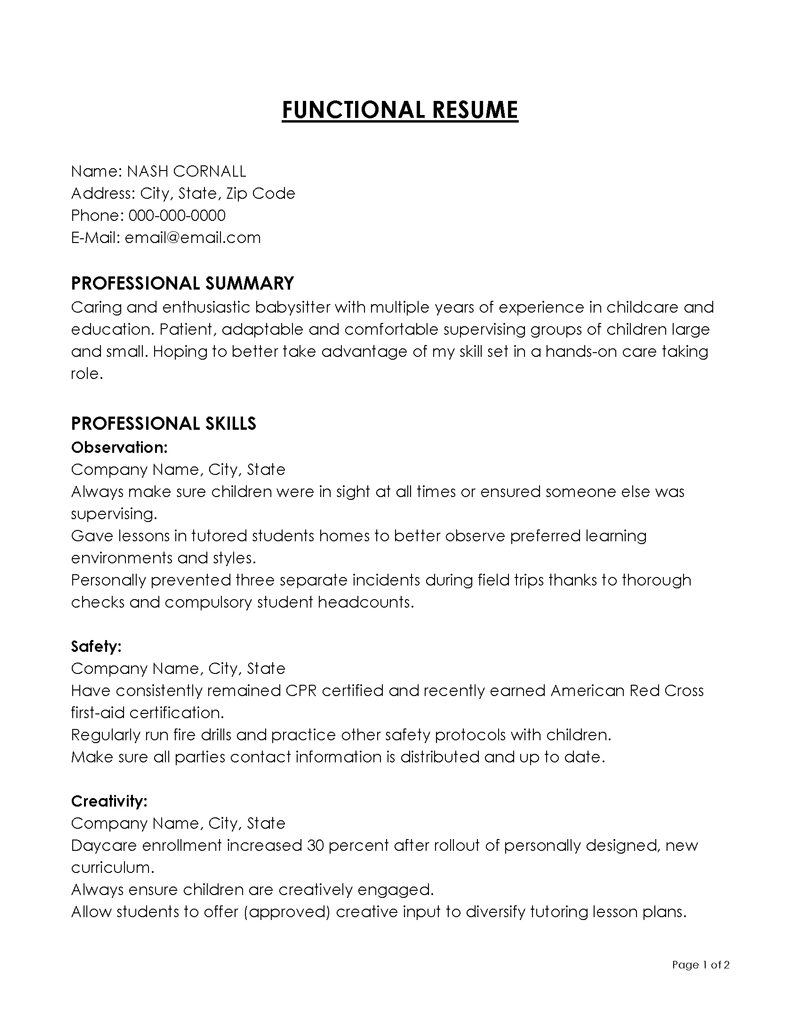
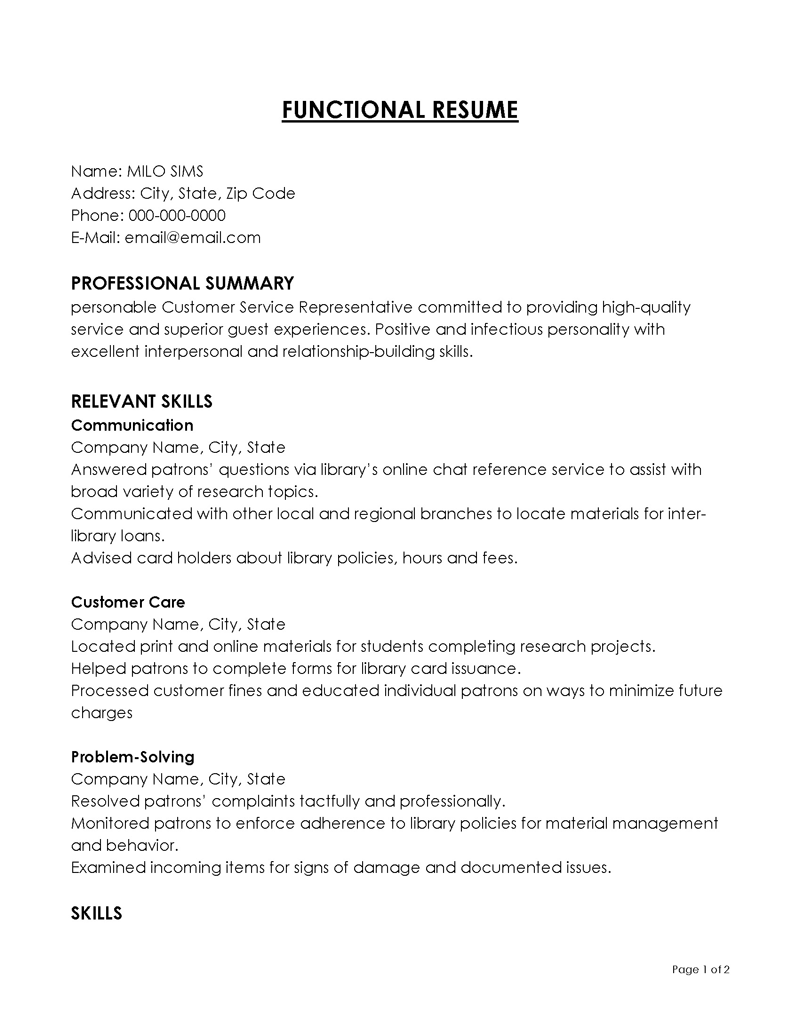
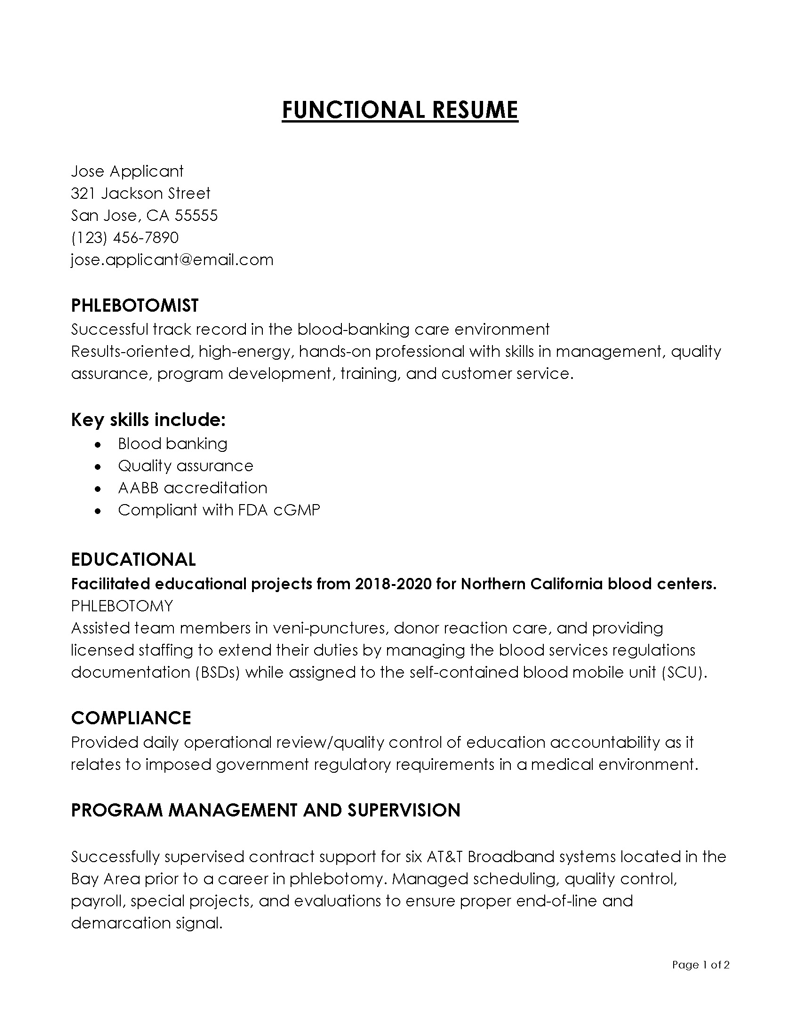
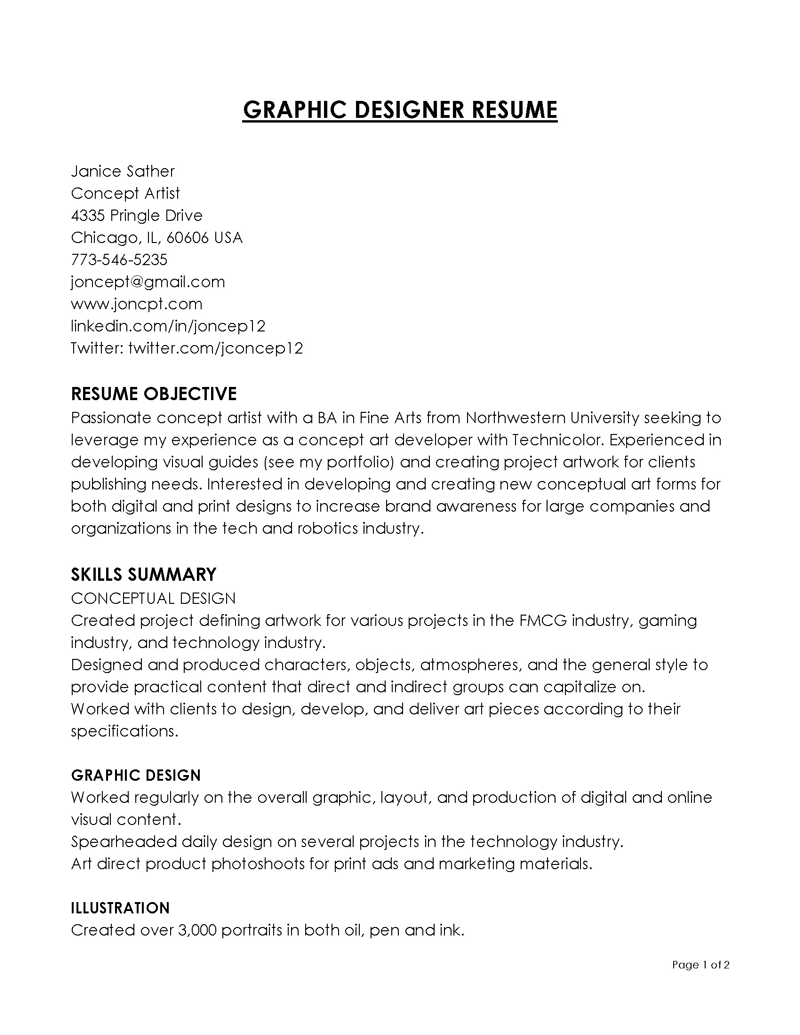
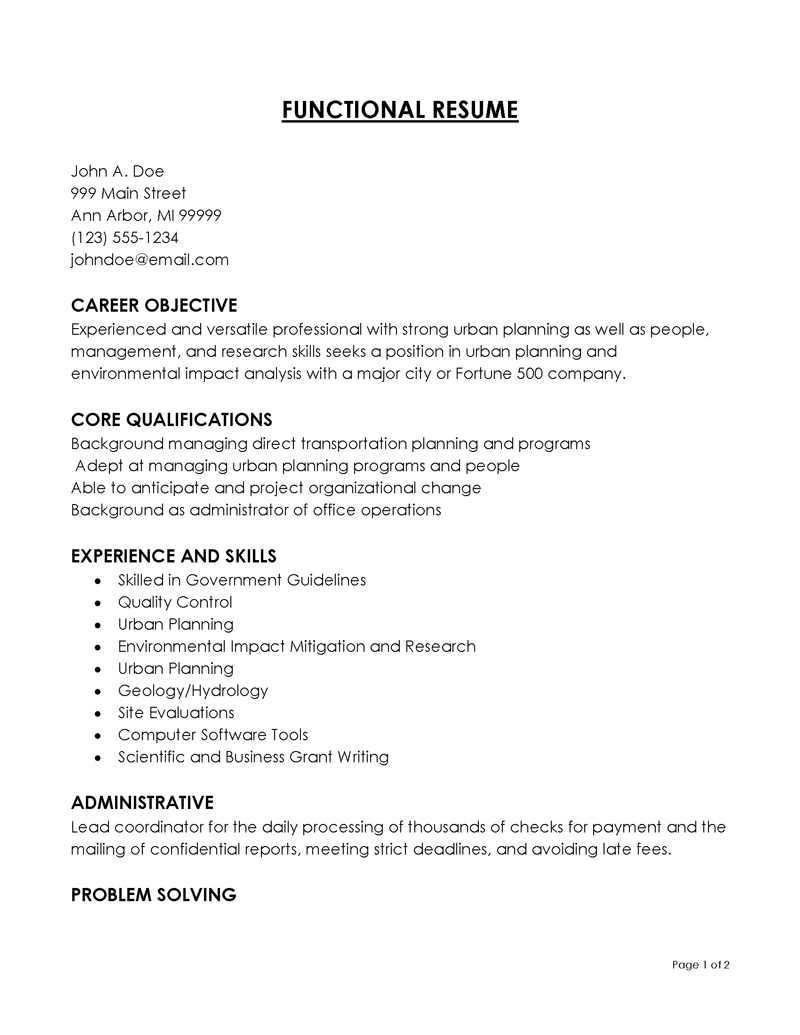
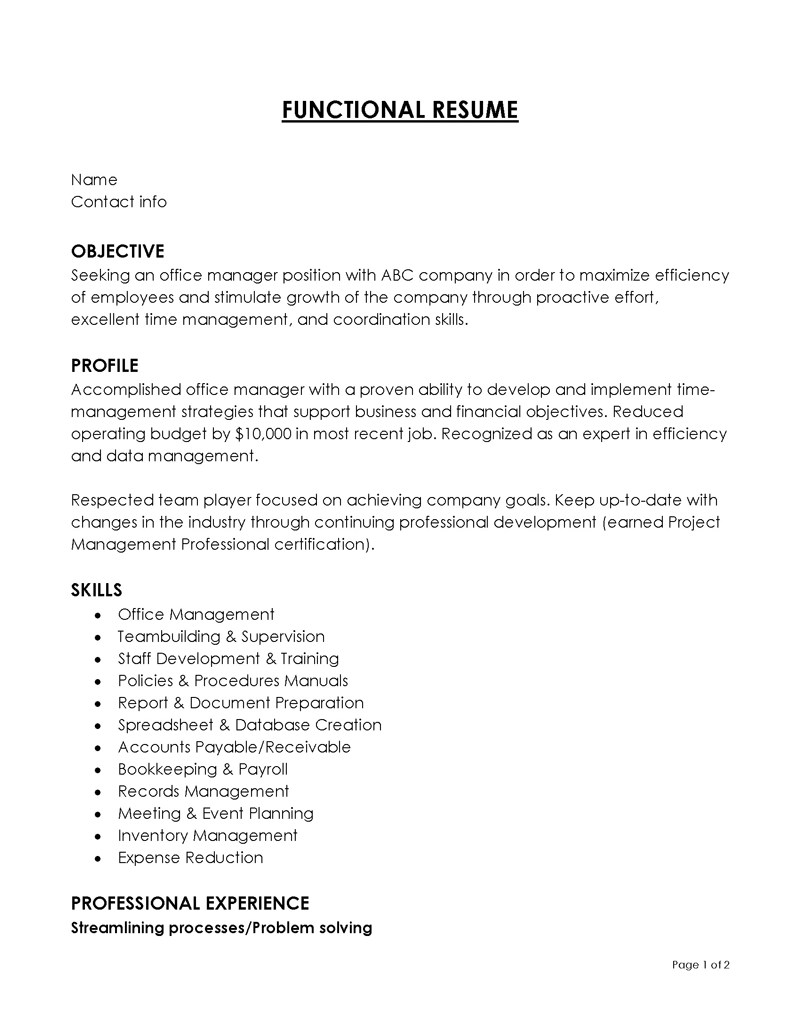
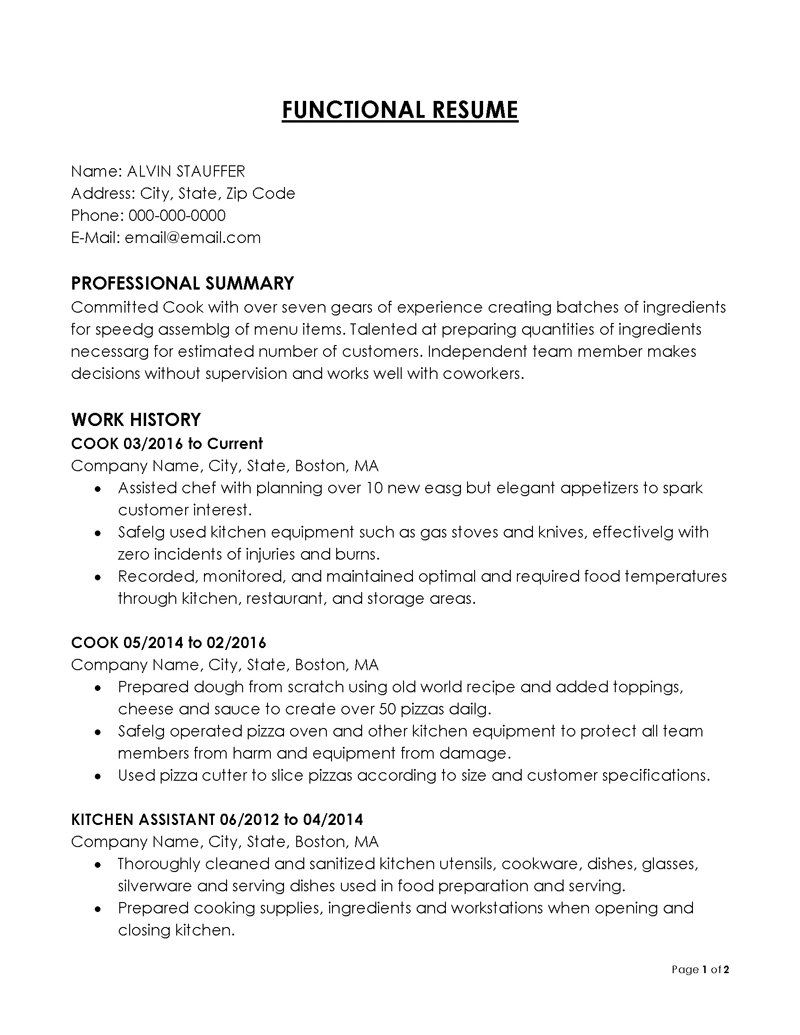
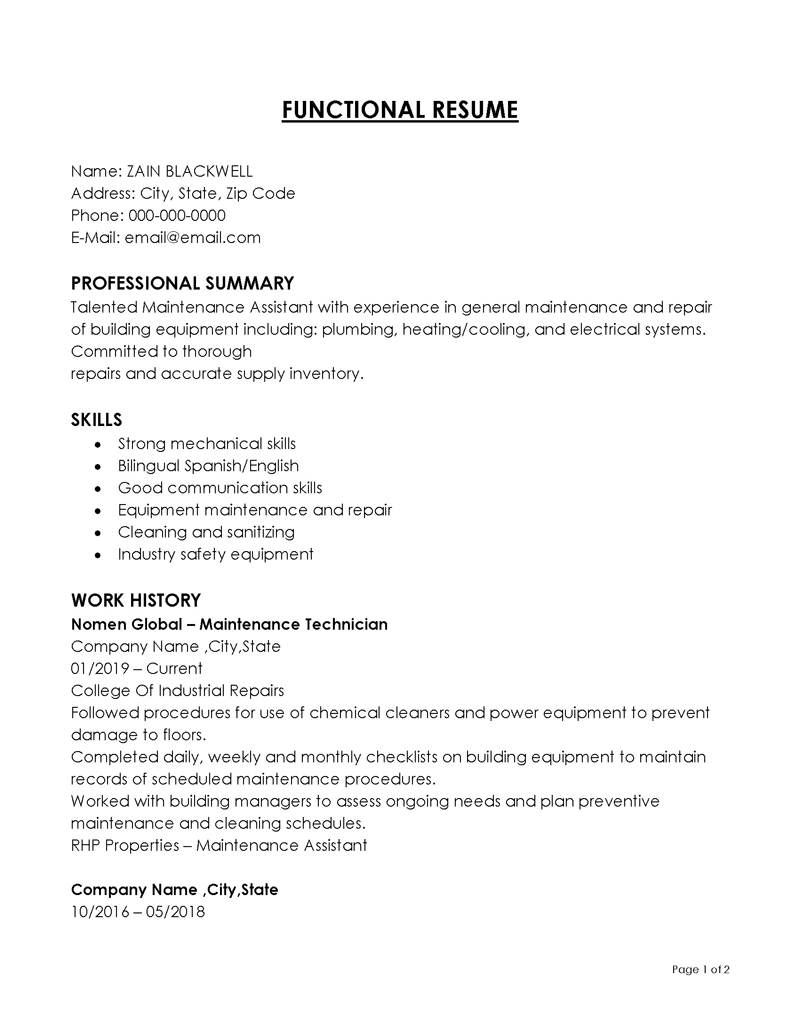
Advantages and Disadvantages of a Functional Format Resume
Here are some advantages of using the functional format resume:
- This resume helps you to highlight your skills, traits, qualifications, and achievements.
- it is excellent for creative candidates who have varied portfolios.
However, the functional format resume also has its disadvantages:
- It is difficult for hiring managers to scan this type of resume due to its format and style.
- This format does not allow you to highlight your work experience or history.
- It is difficult for ATS to scan through this document, so your resume might not be selected by hiring managers for review.
Key Takeaways
- A functional resume format is most appropriate and beneficial for job candidates without work experience, with employment gaps, or when changing careers.
- You can easily attract the job recruiter’s attention to your skills and qualifications relevant to your position.
- Ensure that you include the correct information in your resume and proofread your document if you want to improve your chances of getting the job.
- You can either prepare it from scratch or use our templates to make your work easier and more accurate.








